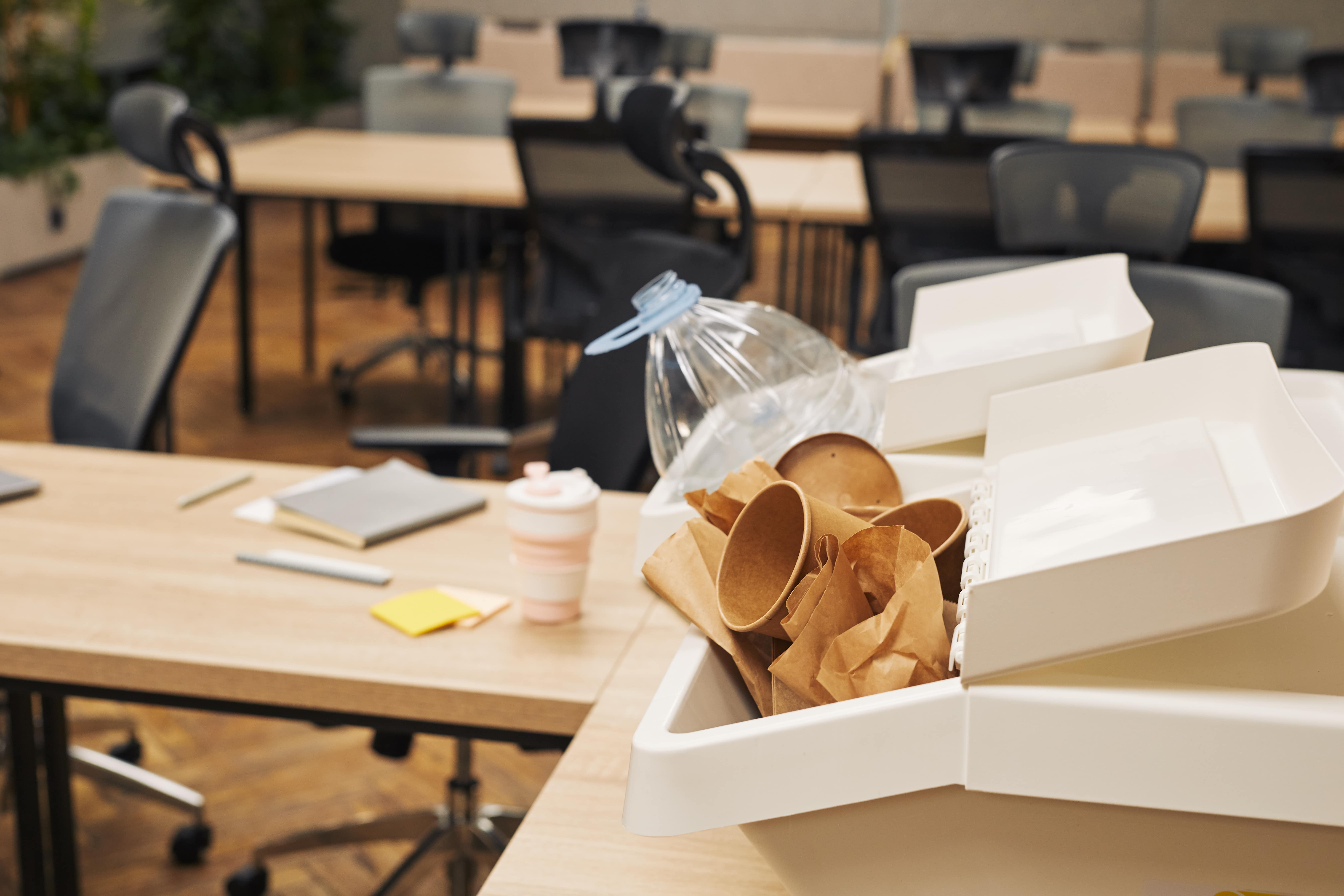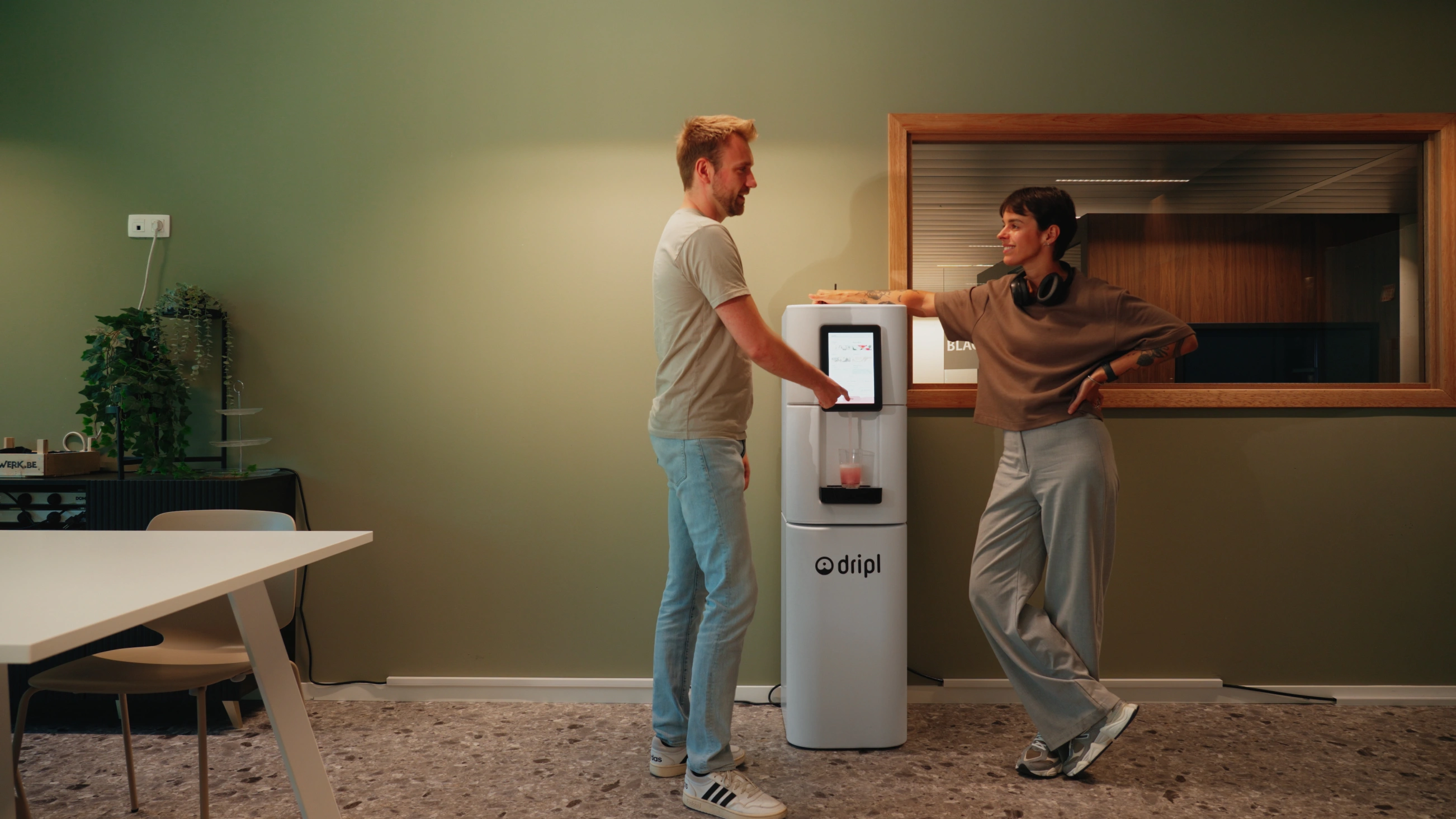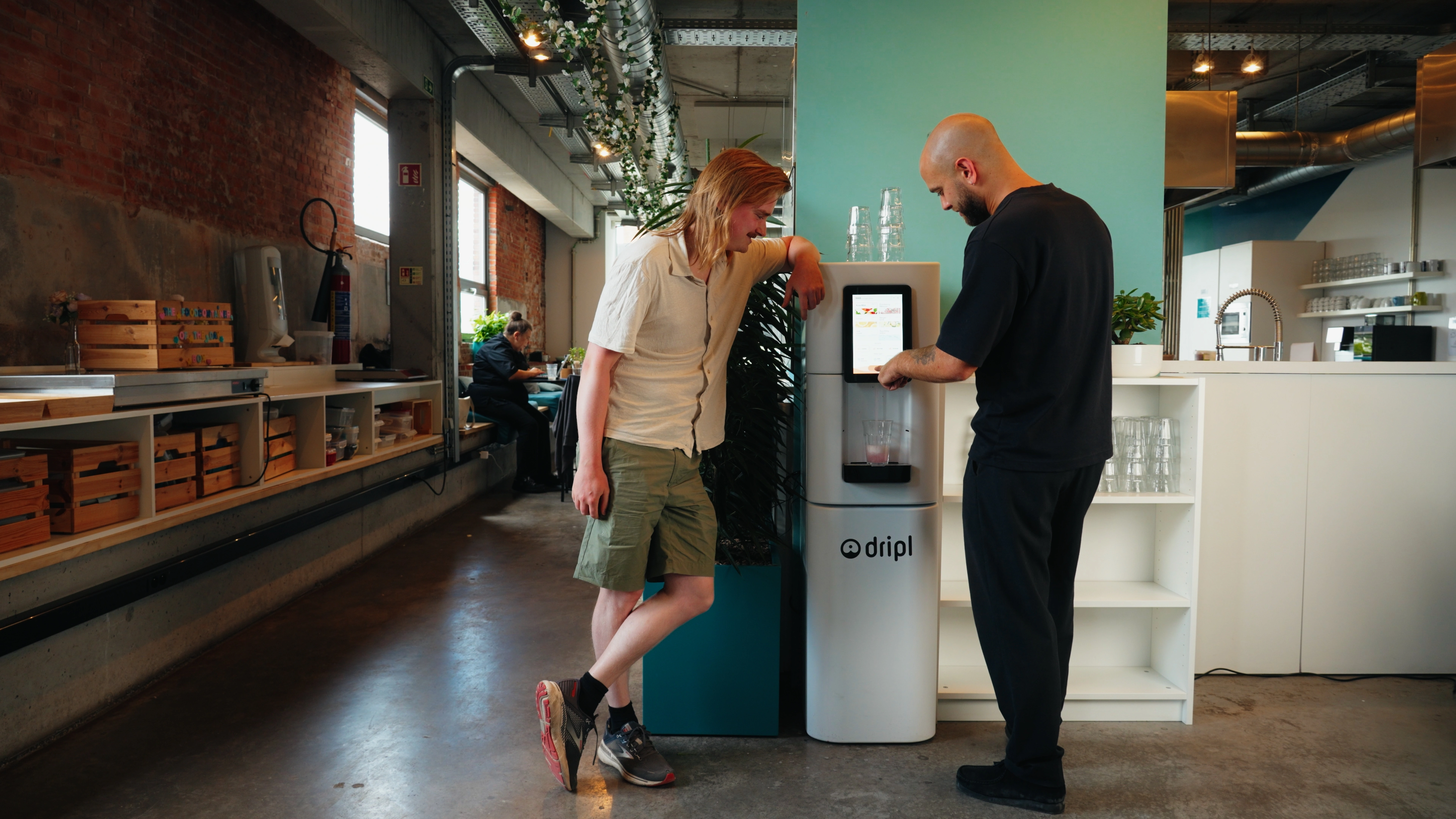All blog posts
Why disposable packaging is enemy No. 1 for any business

Every day we open an average of 7 packages. All that packaging together makes up about 20% of our waste. Half comes from households, the other from companies. The number of the latter will soon increase again. Because if scientists are to be believed and COVID-19 is soon to weaken, companies are again increasing the number of office days. That also means more beverage and food waste. Think cans, bottles, cutlery, salad trays, meal delivery boxes, ... An accumulation of disposable packaging, for the residual waste or in the recycling bag. Here you'll discover 5 disadvantages of that packaging for businesses.

Disadvantage 1: Time and space
Friday afternoon, about four o'clock. In the kitchen, your gaze falls on two empty salad containers on the counter and four plastic bottles on the table. And in the conference room, six cans stand as silent witnesses to the last team meeting.
Recognizable?
All that disposable packaging not only takes up space in the office, it takes up valuable time. Often it's your office manager who takes on the thankless task of picking up trash or reprimanding colleagues who are so out of line with sorting rules. Efficient? No. Productive? Not at all.
If you want to commit to maximum efficiency and productivity, look for alternatives to disposable packaging. Hello reusable bottles, adieu mountains of waste and endless sorting frustrations. Your office manager is going to thank you.
Disadvantage 2: The environment
Harrowing images of oceans polluted by disposable plastics such as cutlery, potato chip bags and bottle caps come to mind. With the growing demand for sustainable solutions, the packaging market is evolving rapidly. There are a lot of options, but they also affect the environment. For example, recycling packaging, like making it, costs energy and raw materials.
Consider a can, which is made of steel or aluminum. Producing new aluminum is especially bad for the environment. Although by reusing steel and recycling aluminum you reduce the amount, you still need energy.
Then take the typical contents of such a can, soda. Did you know that that drink contains 80% water and 20% syrup (read: sugar)? The trucks you encounter in the traffic jam to work are largely filled with the same liquid that flows from your faucet at home. Transporting water releases a large amount of CO2. In fact, road transport is one of the main sources of greenhouse gas emissions in Belgium. Between 1990 and 2019, freight traffic increased 120% in ton kilometers.
Every company bears responsibility in terms of green goals. In your list of actions, you can add the replacement of (recycled) disposable packaging with more sustainable, energy-efficient solutions. For inspiration, consider the wise words once uttered by Karine Van Doorsselaer, teacher of Materials Science & Ecodesign at the University of Antwerp: "The most ecological packaging is the packaging that doesn't exist." If we add it all up, we arrive at some staggering 1.3 billion packages...per day, yep!

Disadvantage 3: Reputation in the 'war for talent'
Disposable packaging indirectly determines which profiles you get in front of you during job interviews. Sustainability is now an advantage in the "war for talent. Especially young employees choose companies that work to make positive change for the planet and society. Organizations that improve their sustainability approach score 40% better on employee retention. You can think of such an approach as a series of actions with different priorities. A clear strategy gives you a competitive advantage in attracting and retaining talent.
Even seemingly small initiatives, such as avoiding disposable packaging, can be part of such a strategy. The introduction of reusable bottles, for example, is a change that is immediately visible to the entire team. However, your actions must be part of a larger coherent whole, because employees judge their employer on actions rather than promises and punish "greenwashing.
Disadvantage 4: Negative "Employee Experience.
Your employees "are" your company: the more productive and engaged they are, the faster your organization grows. Investing in your "employee experience," the sum of all the perceptions an employee has about their interactions with your company, pays off.
Whether it's about their job duties, workplace or health and wellness, in every aspect of their experience, your employees want to feel empowered. It's just as much in the details. Consider the role of the coffee machine, which has long brought employees together for a chat break. In the past, such a machine served lukewarm coffee, at most with a splash of milk and sugar, in a paper cup. Today, specialized coffee bartenders stand gleaming on the countertop. Down to the last drop, the coffee fan can personalize his or her own in true barista-style. Unique experiences are gaining importance, even during break time in the workplace.
Replace standard versions of snacks and soft drinks in disposable containers with healthier options that fulfill the need for an energy boost, for example. With the introduction of such innovative alternatives, support your employees in their choice for better productivity and well-being.
.png)
Disadvantage 5: Health
Of course, there is also an indirect connection between the disposable packaging lying around the office and the health of your employees. Consider the materials those containers are made of, such as plastic. That plastic is everywhere, including in our bodies. Scientists previously found traces of plastic substances in urine and blood. Further research should reveal how dangerous the tiny plastic particles we eat and inhale are. Recyclable disposable containers, emerging as a sustainable alternative to plastic, do not score much better. Those containers made of plant fiber contain a high concentration of Pfas. This is a collective term for fat- and moisture-repelling chemicals, substances that never break down and are therefore called "forever chemicals. Long exposure to them can be harmful.
What's inside those containers can also have a negative impact on health. A big culprit is soft drinks, which are high in sugar and therefore calories. For comparison, a glass of regular soda contains 100 kilocalories, which is equivalent to 6.5 sugar cubes. No wonder drinking it increases the risk of obesity and type 2 diabetes. And that the acids in soft drinks, including diet versions, are bad for your teeth is nothing new under the sun.
Sure, it structural exposure to those materials and consumption of large amounts of soft drinks that are detrimental. But if you provide reusable bottles or natural beverages, for example, you lower the threshold for employees to choose healthier alternatives. Every little bit helps.
Conclusion: join the 'Refillution'
Will you fight the enemy called disposable packaging? Meet the Refill Point from Dripl, a sustainable, packaging-free beverage dispenser. The Refill Point filters and cools tap water only when you tap. That makes it more economical than a traditional beverage dispenser, which uses energy 24-7. The principle is simple: you put down your glass or reusable bottle, choose flat or sparkling water and add any flavor concentrate of your choice. Plus point: the low-sugar and natural drinks stimulate your immune system or boost your energy levels. With the Refill Point, you take care of the planet, your body and your mind. We are avoiding 100,000 packs in 2021 - will you join us to make it 1 million in 2022?

Every day we open an average of 7 packages. All that packaging together makes up about 20% of our waste. Half comes from households, the other from companies. The number of the latter will soon increase again. Because if scientists are to be believed and COVID-19 is soon to weaken, companies are again increasing the number of office days. That also means more beverage and food waste. Think cans, bottles, cutlery, salad trays, meal delivery boxes, ... An accumulation of disposable packaging, for the residual waste or in the recycling bag. Here you'll discover 5 disadvantages of that packaging for businesses.

Disadvantage 1: Time and space
Friday afternoon, about four o'clock. In the kitchen, your gaze falls on two empty salad containers on the counter and four plastic bottles on the table. And in the conference room, six cans stand as silent witnesses to the last team meeting.
Recognizable?
All that disposable packaging not only takes up space in the office, it takes up valuable time. Often it's your office manager who takes on the thankless task of picking up trash or reprimanding colleagues who are so out of line with sorting rules. Efficient? No. Productive? Not at all.
If you want to commit to maximum efficiency and productivity, look for alternatives to disposable packaging. Hello reusable bottles, adieu mountains of waste and endless sorting frustrations. Your office manager is going to thank you.
Disadvantage 2: The environment
Harrowing images of oceans polluted by disposable plastics such as cutlery, potato chip bags and bottle caps come to mind. With the growing demand for sustainable solutions, the packaging market is evolving rapidly. There are a lot of options, but they also affect the environment. For example, recycling packaging, like making it, costs energy and raw materials.
Consider a can, which is made of steel or aluminum. Producing new aluminum is especially bad for the environment. Although by reusing steel and recycling aluminum you reduce the amount, you still need energy.
Then take the typical contents of such a can, soda. Did you know that that drink contains 80% water and 20% syrup (read: sugar)? The trucks you encounter in the traffic jam to work are largely filled with the same liquid that flows from your faucet at home. Transporting water releases a large amount of CO2. In fact, road transport is one of the main sources of greenhouse gas emissions in Belgium. Between 1990 and 2019, freight traffic increased 120% in ton kilometers.
Every company bears responsibility in terms of green goals. In your list of actions, you can add the replacement of (recycled) disposable packaging with more sustainable, energy-efficient solutions. For inspiration, consider the wise words once uttered by Karine Van Doorsselaer, teacher of Materials Science & Ecodesign at the University of Antwerp: "The most ecological packaging is the packaging that doesn't exist." If we add it all up, we arrive at some staggering 1.3 billion packages...per day, yep!

Disadvantage 3: Reputation in the 'war for talent'
Disposable packaging indirectly determines which profiles you get in front of you during job interviews. Sustainability is now an advantage in the "war for talent. Especially young employees choose companies that work to make positive change for the planet and society. Organizations that improve their sustainability approach score 40% better on employee retention. You can think of such an approach as a series of actions with different priorities. A clear strategy gives you a competitive advantage in attracting and retaining talent.
Even seemingly small initiatives, such as avoiding disposable packaging, can be part of such a strategy. The introduction of reusable bottles, for example, is a change that is immediately visible to the entire team. However, your actions must be part of a larger coherent whole, because employees judge their employer on actions rather than promises and punish "greenwashing.
Disadvantage 4: Negative "Employee Experience.
Your employees "are" your company: the more productive and engaged they are, the faster your organization grows. Investing in your "employee experience," the sum of all the perceptions an employee has about their interactions with your company, pays off.
Whether it's about their job duties, workplace or health and wellness, in every aspect of their experience, your employees want to feel empowered. It's just as much in the details. Consider the role of the coffee machine, which has long brought employees together for a chat break. In the past, such a machine served lukewarm coffee, at most with a splash of milk and sugar, in a paper cup. Today, specialized coffee bartenders stand gleaming on the countertop. Down to the last drop, the coffee fan can personalize his or her own in true barista-style. Unique experiences are gaining importance, even during break time in the workplace.
Replace standard versions of snacks and soft drinks in disposable containers with healthier options that fulfill the need for an energy boost, for example. With the introduction of such innovative alternatives, support your employees in their choice for better productivity and well-being.
.png)
Disadvantage 5: Health
Of course, there is also an indirect connection between the disposable packaging lying around the office and the health of your employees. Consider the materials those containers are made of, such as plastic. That plastic is everywhere, including in our bodies. Scientists previously found traces of plastic substances in urine and blood. Further research should reveal how dangerous the tiny plastic particles we eat and inhale are. Recyclable disposable containers, emerging as a sustainable alternative to plastic, do not score much better. Those containers made of plant fiber contain a high concentration of Pfas. This is a collective term for fat- and moisture-repelling chemicals, substances that never break down and are therefore called "forever chemicals. Long exposure to them can be harmful.
What's inside those containers can also have a negative impact on health. A big culprit is soft drinks, which are high in sugar and therefore calories. For comparison, a glass of regular soda contains 100 kilocalories, which is equivalent to 6.5 sugar cubes. No wonder drinking it increases the risk of obesity and type 2 diabetes. And that the acids in soft drinks, including diet versions, are bad for your teeth is nothing new under the sun.
Sure, it structural exposure to those materials and consumption of large amounts of soft drinks that are detrimental. But if you provide reusable bottles or natural beverages, for example, you lower the threshold for employees to choose healthier alternatives. Every little bit helps.
Conclusion: join the 'Refillution'
Will you fight the enemy called disposable packaging? Meet the Refill Point from Dripl, a sustainable, packaging-free beverage dispenser. The Refill Point filters and cools tap water only when you tap. That makes it more economical than a traditional beverage dispenser, which uses energy 24-7. The principle is simple: you put down your glass or reusable bottle, choose flat or sparkling water and add any flavor concentrate of your choice. Plus point: the low-sugar and natural drinks stimulate your immune system or boost your energy levels. With the Refill Point, you take care of the planet, your body and your mind. We are avoiding 100,000 packs in 2021 - will you join us to make it 1 million in 2022?
FAQs
Get your free quote
Get your personalised quote today. We’ll get back to you soon.




-min.png)